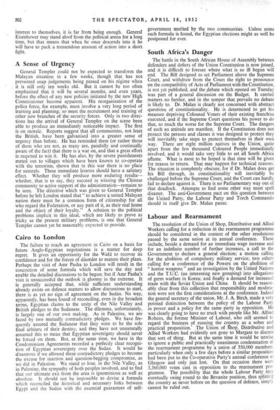A Sense of Urgency
General Templer could not be expected to transform the Malayan situation in a few weeks, though that has not prevented snap judgements being passed on his regime when it is still only ten weeks old. But it cannot be too often emphasised that it will be several months, and even years, before the effect of any new policies initiated by the new High Commissioner become apparent. His reorganisation of the police force, for example, must involve a very long period of training and planning; so must the recruitment and training of other new branches of the security forces. Only in two direc- tions has the arrival of General Templer on the scene been able to produce an immediately noticeable impact. The first is on morale. Reports suggest that all communities, not least the British, have been galvanised into a greater sense of urgency than before. He has reminded them (or rather those of them who are not, as many are, painfully and continually aware of the fact) that there is a war on, and that a great effort is required to win it. He has also, by the severe punishments meted out to villages which have been known to co-operate with the terrorists, shown that in this war there is no place for neutrals. These immediate lessons should have a salutary effect. Whether they will produce more enduring results— whether, that is to say, they succeed in winning the Chinese community to active support of the administration—remains to be seen. The directive which was given to General Templer before he left London stated that" to achieve a united Malayan nation there must be a common form of citizenship for all who regard the Federation, or any part of it, as their real home and the object of their loyalty.' A solution to the political problems implicit in this ideal, which are likely to prove as tricky as the present military problems, is one that General Templer cannot yet be reasonably expected to provide.


































 Previous page
Previous page